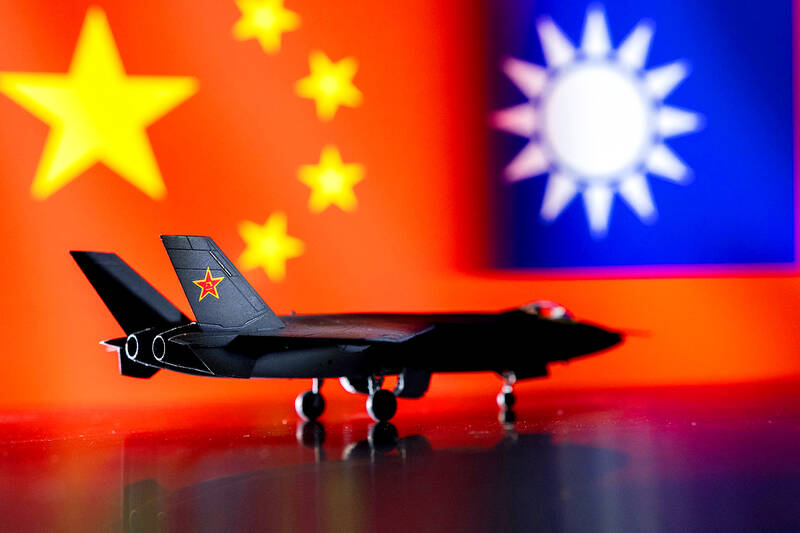If China were to impose a blockade on Taiwan, global economic output would fall by US$2.7 trillion within a year and global GDP would fall 2.8 percent, the latest Global Peace Index showed.
The loss would almost double the effects of the 2008 global financial crisis, following which global trade dropped by more than 17 percent, the report published on Wednesday by the Sydney-based Institute of Economics and Peace said.
A blockade would lead to a fall in investment and consumption, increased volatility in financial markets, a substantial drop in global trade and lower productivity and output in any sector dependent on semiconductors, the report said.

Photo: Reuters
Almost 60 percent of the loss after a blockade would occur in China and Taiwan, whose economies would shrink by about 7 percent and 40 percent respectively, it said.
Countries in Southeast Asia, including Australia, Cambodia, Singapore, South Korea and Vietnam, would be heavily affected, with falls in GDP ranging from 3 to 6 percent, it said.
The effect of a blockade would be especially strong on trade in computers and electronics as countries such as China, South Korea and Japan are highly dependent on imports of computer and electronic components from Taiwan, which is the global leader in semiconductor production, it said.
On the level of peacefulness, Taiwan was ranked 33rd among 163 countries around the world and categorized as “high” in peacefulness, the report showed.
Iceland remained the most peaceful country, a position it has held since 2008, followed by Denmark, Ireland, New Zealand and Austria.
Afghanistan was listed as the least peaceful country in the world for the eighth consecutive year, followed by Yemen, Syria, South Sudan and the Democratic Republic of the Congo.
The average level of global peacefulness deteriorated by 0.42 percent, the ninth consecutive year that measure has fallen, the report said, adding that the war in Ukraine had a significant effect on global peace.
“Over the last 15 years the world has become less peaceful,” with only two years recording year-on-year improvements in the level of global peacefulness, the report said.

A Ministry of Foreign Affairs official yesterday said that a delegation that visited China for an APEC meeting did not receive any kind of treatment that downgraded Taiwan’s sovereignty. Department of International Organizations Director-General Jonathan Sun (孫儉元) said that he and a group of ministry officials visited Shenzhen, China, to attend the APEC Informal Senior Officials’ Meeting last month. The trip went “smoothly and safely” for all Taiwanese delegates, as the Chinese side arranged the trip in accordance with long-standing practices, Sun said at the ministry’s weekly briefing. The Taiwanese group did not encounter any political suppression, he said. Sun made the remarks when

The Taiwanese passport ranked 33rd in a global listing of passports by convenience this month, rising three places from last month’s ranking, but matching its position in January last year. The Henley Passport Index, an international ranking of passports by the number of designations its holder can travel to without a visa, showed that the Taiwan passport enables holders to travel to 139 countries and territories without a visa. Singapore’s passport was ranked the most powerful with visa-free access to 192 destinations out of 227, according to the index published on Tuesday by UK-based migration investment consultancy firm Henley and Partners. Japan’s and

BROAD AGREEMENT: The two are nearing a trade deal to reduce Taiwan’s tariff to 15% and a commitment for TSMC to build five more fabs, a ‘New York Times’ report said Taiwan and the US have reached a broad consensus on a trade deal, the Executive Yuan’s Office of Trade Negotiations said yesterday, after a report said that Washington is set to reduce Taiwan’s tariff rate to 15 percent. The New York Times on Monday reported that the two nations are nearing a trade deal to reduce Taiwan’s tariff rate to 15 percent and commit Taiwan Semiconductor Manufacturing Co (TSMC, 台積電) to building at least five more facilities in the US. “The agreement, which has been under negotiation for months, is being legally scrubbed and could be announced this month,” the paper said,

MIXED SOURCING: While Taiwan is expanding domestic production, it also sources munitions overseas, as some, like M855 rounds, are cheaper than locally made ones Taiwan and the US plan to jointly produce 155mm artillery shells, as the munition is in high demand due to the Ukraine-Russia war and should be useful in Taiwan’s self-defense, Armaments Bureau Director-General Lieutenant General Lin Wen-hsiang (林文祥) told lawmakers in Taipei yesterday. Lin was responding to questions about Taiwan’s partnership with allies in producing munitions at a meeting of the legislature’s Foreign Affairs and National Defense Committee. Given the intense demand for 155mm artillery shells in Ukraine’s defense against the Russian invasion, and in light of Taiwan’s own defensive needs, Taipei and Washington plan to jointly produce 155mm shells, said Lin,